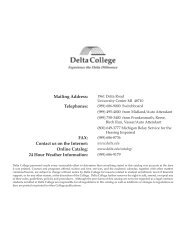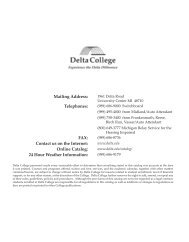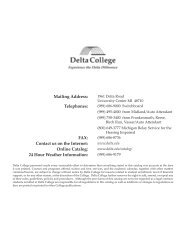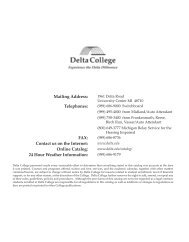2012 - 2013 catalog - Delta College
2012 - 2013 catalog - Delta College
2012 - 2013 catalog - Delta College
You also want an ePaper? Increase the reach of your titles
YUMPU automatically turns print PDFs into web optimized ePapers that Google loves.
Course Information<br />
Courses listed in this section are those which <strong>Delta</strong> <strong>College</strong> is approved<br />
to offer; however, inclusion of a course does not obligate the <strong>College</strong> to<br />
offer the course in any particular semester or year. Most of the courses<br />
listed will be offered at least once during a complete academic year.<br />
Course offerings are listed on My<strong>Delta</strong> search for classes in late January<br />
for the Spring/Summer and Fall Semesters, and by late September for<br />
the Winter Semester. Courses in this section, as well as on My<strong>Delta</strong>,<br />
are listed in alphabetical order by department name according to three<br />
or four character course numbers.<br />
An Example<br />
Department Area Name<br />
Catalog Number<br />
Course Title<br />
Course Credits<br />
ACC 211 Principles of Accounting 1 4 Sem Hrs<br />
Prerequisite: MATH LEVEL 4 or “B” or higher in MGT 110<br />
and READING LEVEL 2 or “B” or higher in ACC 111.<br />
Introduces basic concepts of accounting principles. Includes<br />
the accounting cycle for service and merchandising businesses,<br />
internal control, accounting for current assets, long-term<br />
assets, current liabilities, and owner’s equity. Recommended<br />
for transfer (as an alternate to ACC 111 (60-15)<br />
Course Description<br />
Course Prerequisite<br />
Hours of Instruction<br />
(lecture-laboratory)<br />
Course Credits<br />
1. Each course is assigned a number of credits which generally indicates<br />
the number of hours per week the course meets. Courses<br />
with labs and occupational courses, however, generally meet more<br />
hours than the number of credits they carry.<br />
2. Tuition rates are assessed on a per-credit-hour basis, and vary<br />
depending on your residency classification. Total tuition for<br />
each course must be paid at registration time.<br />
Course Descriptions<br />
1. Below each course number and title, a brief course description is<br />
provided. You should read this description carefully to be sure you<br />
are qualified to take the course and that the course content meets<br />
your needs and interests. If you need additional information, you<br />
may contact the Chair of the Division which offers the course or<br />
the course instructor.<br />
2.. Instructors often give supplemental course information (i.e., course<br />
outline, syllabus, tasks and competencies, etc.), during the first week<br />
of classes, so students will know specific course procedures, grading<br />
criteria, and course objectives. Circumstances such as illness,<br />
inclement weather, class composition and size, or the introduction<br />
of timely material may necessitate some adjustments. The <strong>College</strong><br />
recognizes the right of the faculty member to exercise professional<br />
judgment in making such adjustments.<br />
Hours of Instruction<br />
The numbers given within parentheses at the end of each course description<br />
indicate the total number of hours each course will be scheduled<br />
within a semester. The first number specifies total lecture hours<br />
and the second number specifies total laboratory or clinical hours for<br />
the course.<br />
Course Numbering System<br />
All <strong>Delta</strong> <strong>College</strong> academic courses have a three to five character course<br />
number. My<strong>Delta</strong> Search for Classes, which is available online prior to<br />
each semester, lists courses in alphabetical order by subject area name<br />
according to these course numbers.<br />
1. Courses below 100 are considered developmental and do not meet<br />
graduation requirements.<br />
2. Courses within the 100-199 series generally represent freshmanlevel<br />
courses; however, these courses may also be taken by sophomores.<br />
3. Courses within the 200-389 series are intended primarily for sophomores;<br />
however, these courses may be taken by freshmen having<br />
the necessary prerequisites.<br />
4. Courses within the 290-299 series designate special courses as<br />
follows: 291 Independent Study (arranged on an individual basis<br />
between student and faculty member; see Independent Study Course<br />
Information in this section); 292-299 Special Topics/Seminars (such<br />
courses will be offered as regular courses upon demand or to meet<br />
the special needs of some programs, except ACE courses).<br />
Course Designations<br />
Courses designated by an “H” (for Honors), “C” (for courses that require<br />
co-registration in another course), and “W” (for Writing), are considered<br />
course variations of a regular course and incorporate the same course<br />
content. Course variations are considered equal in meeting graduation<br />
requirements and prerequisites. Lab courses designated by an “L” are<br />
not considered a course variation.<br />
Honors<br />
Honors courses incorporate all regular course content with greater emphasis<br />
on enrichment and becoming actively involved in the learning<br />
process. You learn and apply diverse concepts while stressing creative<br />
and critical thinking. You will be expected to be more self-directed<br />
with a goal of understanding the theoretical base of the subject matter.<br />
Honors courses and Honors Options are designated on your transcript<br />
with an “+” designation. Honors students who meet certain eligibility<br />
criteria will be assigned priority registration. See www.delta.edu/honors<br />
for eligibility information.<br />
Course Prerequisites<br />
Prerequisites listed at the beginning of course descriptions are courses<br />
which must be taken or skill levels which must be met before enrolling<br />
in the course. Skill levels are demonstrated by either assessment scores<br />
or course grades according to the following tables. Some prerequisites<br />
are not computer-enforced, but may be enforced at the discretion of<br />
the division.<br />
A Bachelor’s Degree from a regionally accredited institution meets<br />
prerequisites which require <strong>College</strong> Composition II. Official transcripts<br />
must be provided to the <strong>Delta</strong> <strong>College</strong> Registrar’s Office.<br />
332 Online Catalog available at: www.delta.edu/<strong>catalog</strong>/<br />
<strong>Delta</strong> <strong>College</strong> <strong>2012</strong>-<strong>2013</strong>











